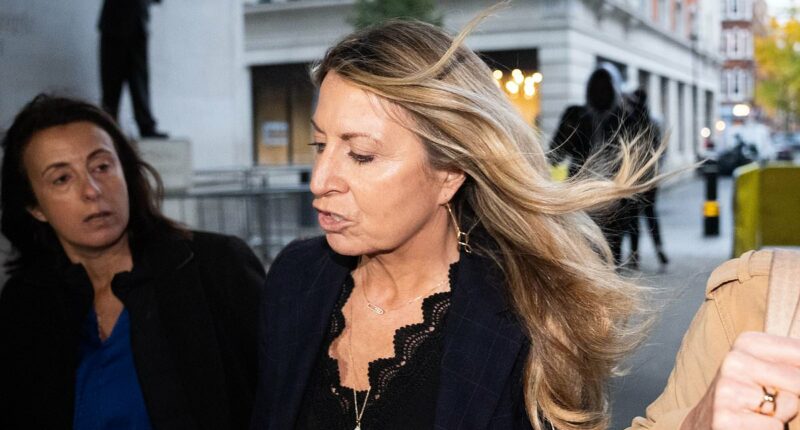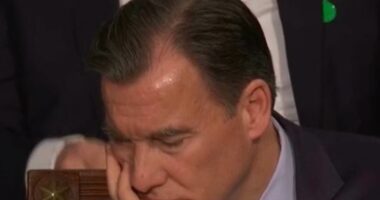Share this @internewscast.com
As Deborah Turness entered the wood-paneled boardroom on the third floor of BBC Broadcasting House, the atmosphere was thick with tension.
Turness, the BBC’s first-ever chief executive of news and current affairs, was ready to address the recent barrage of accusations targeting the corporation, including claims of serious bias and the editing of a significant speech by Donald Trump.
However, Thursday afternoon’s board meeting didn’t proceed as Turness had hoped. Instead of support, she faced outright hostility from the 12-member board of directors, which had included Tim Davie, the director-general, up until the previous Sunday evening.
Turness arrived prepared with a brief statement that she had crafted two days earlier with her advisors. The statement acknowledged the mishandling of the Trump speech editing.
A senior source noted, “The statement was meant to send a strong message to the public and staff that we mishandled an 11-second clip in an otherwise solid Panorama program. It was crucial to reassure staff, who were confused by the criticism, that we stood by our journalism.”
Turness’s attempt at an apology to the BBC board failed to resonate. Her argument, presented rapidly and energetically, that the issue could have been avoided with a clearer distinction between two parts of the speech, also did not gain traction.
She was already skating on thin ice but it was at this point that Turness started sinking beneath the surface.

Deborah Turness (pictured centre), chief executive of BBC News, hit back at claims that the BBC was institutionally biased as she arrived at Broadcasting House Monday morning

Ms Turness also fired back at Donald Trump’s claim that the corporation is ‘corrupt’
The board quite simply wasn’t having it. One BBC director after another turned on her, with the majority arguing the Trump edit was designed to deceive the viewer.
And that wasn’t their only criticism. Turness also took heavy fire over another perceived failing of her department, which had been highlighted in the extraordinary 19-page report by the corporation’s former independent adviser to its Editorial Guidelines and Standards Board which was leaked last week with such devastating consequences.
The dossier alleged that an all-powerful ‘LGBT desk’ had the authority to veto stories which challenged their dogmatic opinions on gender and trans ideology. This had clearly disturbed the board, with another source at the meeting telling me: ‘There wasn’t any shouting but there was cold concealed rage and Deborah Turness was cut to shreds.’
One of her foremost critics was Sir Robbie Gibb, the BBC’s former Westminster editor, who left the corporation in 2017 to become communications chief to Theresa May at No 10.
He joined the BBC board in 2021 when Boris Johnson was prime minister and it was Boris who brought matters to a head at the weekend by using his Saturday column in the Daily Mail to announce that he would withhold his £174.50 annual licence fee unless the director-general broke his silence on the Trump controversy or resigned.
After nearly four decades in broadcasting, including eight years as president of NBC News in New York, Turness is a steely operator who even her critics suggested was worth her £400,000 BBC salary. But she is clearly also a master of understatement, having confided to colleagues after the bruising board meeting: ‘It didn’t go that well.’

Director-general Tim Davie quit the BBC on Sunday after five years in the corporation’s top job

BBC chairman Samir Shah (above) rejected claims of systemic bias at the BBC
After returning to her ground-floor office and taking stock of her position, I hear Turness was initially determined to ride out the storm.
She was, however, becoming ever more exasperated by the BBC management’s decision to abide by what was increasingly resembling a Trappist vow of silence when it came to the soaring number of bias allegations being levelled against it.
A senior corporation executive says: ‘It’s classic BBC. Bury your head in the sand, ignore the critics, and hope the whole thing will go away, which it never does. But Deborah wanted to fight back because it wasn’t just about a Trump edit, she wanted to take on the accusation of institutional bias in that dossier which cuts to the very heart of everything she was doing.
‘She was raging that no one was fighting for the 6,000 or so journalists, across ten channels, who produce material 24 hours a day in 43 languages 365 days a year. So of course mistakes are made.’
The day after the board meeting the crisis got a whole lot worse. The Israeli embassy criticised the BBC for ‘deeply flawed’ coverage, an attack that echoed their earlier concerns about bias. And both Tory and Reform UK politicians threatened to force a review of the corporation’s funding.
In a letter to staff, an unrepentant Turness talked about the ‘difficult week’ the BBC had endured because of reporting in ‘some quarters’, a reference that her enemies argued showed she had misjudged the mood of the country.
This siege mentality worsened on Friday evening – only hours after Turness had sent her staff letter – when the Trump White House swung into action, accusing the BBC of being a ‘Leftist propaganda organisation’ spewing out ‘fake news’.
This provoked an extraordinary intervention by Nick Robinson, a presenter on Radio 4’s flagship Today programme, who used his platform to launch into a highly unorthodox monologue on Saturday morning’s show.

BBC star Nick Robinson gave a monologue on the Today Programme on Radio 4 on Saturday following the fallout
After accepting there was concern about editorial mistakes at the BBC, he declared live on air: ‘There is also a political campaign by people who want to destroy the organisation that you are currently listening to.’
Despite the growing furore, however, the BBC’s top brass refused to rush out a response to the corporation’s detractors, contenting themselves with an announcement that their side of the story would come in the form of a detailed letter from Samir Shah, the affable chairman of the BBC, to the Commons Culture, Media and Sport Committee.
The governors were not planning to release the letter until early this week but, following Sunday night’s shock resignations, it was sent yesterday.
One seasoned BBC executive says the BBC board should have taken Turness’s advice. ‘She had a pithy statement, which she took to the chairman’s office last Tuesday, a whole week ago. But the governors knew best. They forbade her to release it.
‘For BBC management to agree a statement, you need drafts, more drafts, then it goes backwards and forwards, endlessly, with so many people to sign it off and have their say. We shot ourselves in the foot every day we allowed this to drag on without saying anything in public.’
By Sunday, of course, Turness knew the game was up. She realised that she had lost the confidence of the governors and so decided to resign.
When she addressed the BBC newsroom yesterday following her decision, Turness was, at times, overcome with emotion. The question now is: will she go quietly?
When she quit ITN in 2013 to become president of NBC News, the compilation of tributes taped by colleagues that was prepared for Turness featured a mock weather forecast referencing her nickname ‘Hurricane Deborah’.

Donald Trump last night threatened to sue the BBC for $1billion in damages unless it issued a full and fair retraction, an apology and ‘appropriate’ compensation
Given her reputation as something of a mercurial character, the people who forced her out may now be worried. After all, she knows where all the bodies are buried.
As one veteran BBC executive told me yesterday: ‘The Donald Trump editing horror, the undue influence of the trans lobby and other major failings at the BBC, were all in the whistleblower dossier which the BBC board of governors saw last May – six months ago.
‘They did nothing about it. They went quiet. Until it inevitably leaked. None of the governors has lost their job. I don’t think it’s all over yet.’
And then, as if on cue, Donald Trump last night threatened to sue the BBC for $1billion in damages unless it issued a full and fair retraction, an apology and ‘appropriate’ compensation.
Typhoon Trump could well prove an even more formidable opponent than Hurricane Deborah.

















